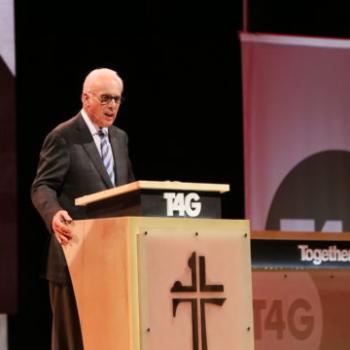Review of The Courage to Be Protestant by David Wells
It takes no courage to sign up as a Protestant. After all, millions have done so throughout the West. They are not in any peril. To live by the truth of historic Protestantism, however, is an entirely different matter. That takes courage in today’s context. (1)
What has happened to American Christianity in the 20th (and now 21st) century? How have we gone from thoughtful and faithful Puritans building a church in a “howling wilderness” to people with such fuzzy theology that we can no longer say with certainty that Americans who claim to be Christians necessarily believe in hell, the Incarnation, the Resurrection, the authority of Scripture, or the meaning of the atonement? For that matter, some of the more postmodern Christians even doubt the meaning of words in general—what can be done in such circumstances? In The Courage to Be Protestant, David Wells provides an analysis of and answer to the general collapse of modern Evangelical Christianity. (This book also doubles as a summary of his previous four books on the same subject: No Place for Truth, God in the Wasteland, Losing Our Virtue, and Above All Earthly Powr’s).
So just what is wrong with American Evangelical Christianity? It all began with the split in the 1940s and 50s between Fundamentalists and Evangelicals. Where the Fundamentalists retrenched themselves in increasing cultural isolation and doctrinal rigidity, Evangelicals embraced the dual ideas of unity around the basics and diversity in non-essential doctrines. This Evangelical attitude, though unobjectionable in and of itself, had some very objectionable results:
The goal that diversity in secondary matters would be welcomed quite soon passed over into an attitude that evangelicalism could in fact be reduced simply to its core principles of Scripture and Christ. In hindsight, it is now rather clear that the toleration of diversity slowly became an indifference toward much of the fabric of belief that makes up Christian faith….
Christianity became increasingly reduced simply to private, internal, therapeutic experience. Its doctrinal form atrophied and then crumbled. (8)
Eventually even the church as an institution fell into disrepair and disuse (if not quite ever disdain) as it was increasingly viewed as a “secondary matter.” Evangelicals embraced virtually everything from parachurch organizations to home fellowships to televangelism as replacements for participation and membership in a local body of believers.
What filled the void in the Evangelical world traditionally filled by the institutional church? Enter two groups: the Marketers and the Emergents. The Marketers believed that Evangelicals could share the Gospel with massive numbers of people by adopting the methods and styles of corporate America—that is, to deliver the old evangelical message in new ways. (13) And yet, this innovative approach was not without problems:
This is always the rub in this experiment: the form greatly modifies the content. The loud music and short services are part of the form, but the form, put together to be pleasing, actually undercuts the seriousness of the faith. The form is in fact the product, and in this market the sale has to be done quickly and as painlessly as possible because the customers all have itchy feet. That greatly militates against the seriousness any church wants to have. And that is why a deep chasm has opened between the church marketers and historic Protestant orthodoxy. It is less that the truths of this orthodoxy are assailed than that they are seen to be irrelevant to the building of the church. (14)
The relative emptiness and disconnectedness of the Marketers, in turn, facilitated the rise of postmodern Christians—the Emergents.
It can be difficult to articulate what the Emergents are for, since they’re much more concerned with vague and slippery terms like “conversation” and “openness” than they are with, well, specific, concrete truth (more on that bold claim in a bit). In fact, Wells argues that these postmodern Christians who otherwise claim to be without category are in fact tied together by two main characteristics. First, they prioritize personal communication and conversation (as opposed to the impartial and cold Marketer mega-churches) over adherence to particular (and potentially divisive) doctrines; and second, they place a high value on openness as a means of including the greatest possible number of people, groups, and ideas in the ‘faith’ conversation.
Emergents are also doctrinal minimalists. They are ecclesiastical free spirits who flit around a much smaller doctrinal center and are often obliging of cultural and generational habits. By their very posture they are resistant to doctrinal structure that would contain and restrict them….
The loss of truth is being offset by increasingly adventurous experiments in worship and by various attempts at recovering a lost sense of mystery. My view is that this kind of offsetting is an illusion. There is no offset for the loss of truth. There can only be a cover-up of what has taken place. When our knowledge of God’s truth is diminished, our understanding of God is diminished, and no amount of contrived mystery through ancient liturgies or gathering in the presence of dim, flickering candlelight can compensate for this loss. (17-18)
In contrast to these modern Evangelical movements, Wells argues that what we truly need is Biblical truth—truth best expressed in the five solas of the Protestant Reformation:
In Scripture alone is God’s authoritative truth found, in Christ alone is salvation found, it is by grace alone that we are saved, and this salvation is received by faith alone. Only after each of these affirmations is made can we say that salvation from start to finish is to the glory of God alone. These affirmations do not stand simply as solitary, disconnected sentinels, but they are the key points in an integrated, whole understanding of Biblical truth. This is what gives us a place to stand in the world from which to understand who we are, what the purposes of God are, and what future lies before us. (21)
All of this is from the introduction—the bulk of the book is Wells’ exposition of modern Evangelicals’ failure to hold to biblical truths in the specific doctrines of Truth itself, God, the Self, Christ, and the Church.
I can say with little hyperbole that The Courage to Be Protestant should be read by every thoughtful Christian interested in the state of the church—which of course should be every Christian. It provides a thorough critique of the two main trends in Evangelicalism which, unfortunately, led us in directions that are ultimately contrary to the Gospel.
Don’t get me wrong, this book is no crotchety cavil against young people! Wells is even-handed and fair in his treatment of the Marketers and Emergents alike. He acknowledges the strengths of their positions, the legitimate concerns they raise, and their sincere pursuit of an authentic Christian life. Yet he is also relentless in his call for a return to foundations built on the historical truths of the faith, even at the cost of so-called “relevance.” It is more important, he argues, to hold to what God has revealed in Scripture than it is to be open, conversational, or appealing. And while being open, conversational, and appealing may be , at times, both beneficial and appropriate, these considerations must never be allowed to overwhelm (or overshadow) the good news of forgiveness by grace alone through faith alone in Christ alone as revealed in Scripture alone to the glory of God alone.
Especially useful for the 21st century is Wells’ critique of postmoderism (the Marketers are still around, to be sure, but their era seems to be coming to a rather banal end). The Emergent church, he argues, has attempted to build a church relevant to the modern world—a church based on personal relationships, openness, and communication (see above). In the process, the Emergent church has bought into postmodern criticisms of language, knowledge, and society, with the result that truth has come under open attack even by those who claim to follow the one who is the Way, the Truth, and the Life. As an alternative to these trends in Evangelicalism, Wells argues that:
Truth statements do indeed correspond to what is out there. Biblical affirmations are neither arbitrary nor provisional but have all the weight of eternity behind them. And the biblical authors clearly assume that despite capacities for misreading our own desires into this truth, seeing only what we want to see, refusing to see what is actually there, we can still know this truth. And this is so despite the many innocent mistakes that we might also make in reading the Scriptures. (80)
There will come a point when those in Evangelical Christianity with postmodern inclinations will have to choose whether to be critics of truth or to stand on it. Wells is quite clear about what the Bible demands they do.
The drawbacks of this book are mostly related to the fact that it is a summary of the previous four in the series (linked above). For example, Wells points out that he doesn’t cite any of his sources in The Courage to Be Protestant because extensive citations can be found in the other volumes. Which is fair enough, I suppose, though a bit irritating to those of us who haven’t read the other four (yet). Likewise, Wells can at times paint with too broad a brush—not all Emergents are postmodern, and no doubt there are some Marketers who aren’t actually driven by the culture. I assume that the other books provide more nuance and caveats, but a clarifying footnote here and there may have been helpful from time to time even in this condensed work.
However, even with its handful of drawbacks, this book is a fantastic criticism of current trends in American Evangelical life.
Highly recommended.
Dr. Coyle Neal is Assistant Professor of Political Science at Southwest Baptist University, where he hurls crotchety cavils at young people on a regular basis.












